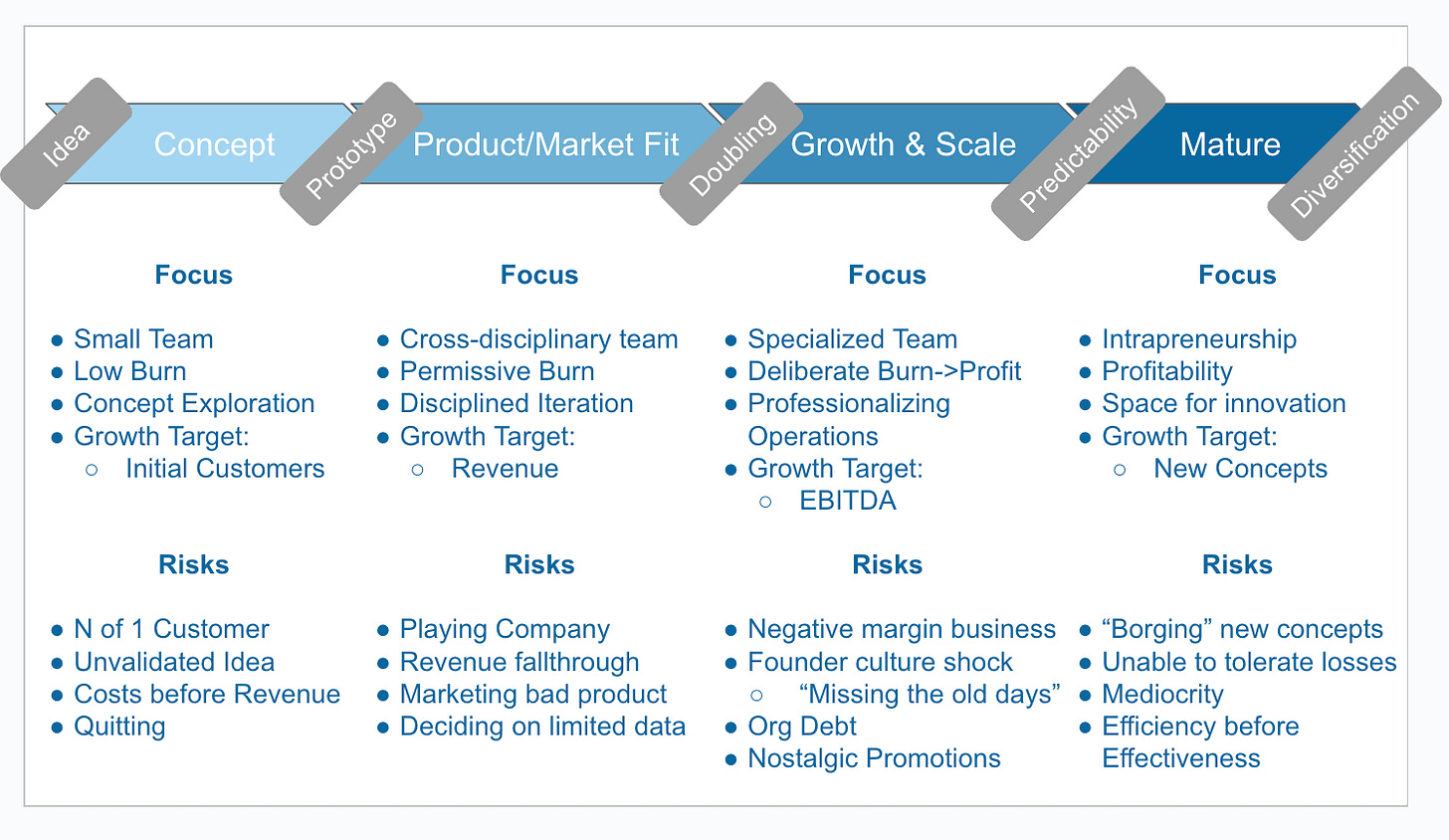It’s happening. Everything promised comes to pass and you are crushing it. You are raking in customers, fighting fires everywhere and hiring to keep up. Congratulations and welcome to the Growth & Scale stage!
Now that you’ve (finally) found gold there is some rough news coming: You are going to have to basically rebuild the entire company for its newfound clarity of purpose. Fear not, if you’ve been following along, you are prepared for this. There are TONS of great resources for scaling companies, so please follow the links to the promised land of other peoples’ experience. The discipline you’ve developed will support you through the next phase. Strategic preparation with frameworks like Playing to Win, capability development using OKRs, continuous work using Scrum@Scale, and applying DevOps principles to everything you do will get you there. The “how” of designing your organization for Growth & Scale is a focus of Schutzworks, so expect more posts about this topic. For now, let’s focus on what to expect.
Your goal in the Growth & Scale stage is exactly that: Increase revenue AND (finally) margin from existing business lines. While you previously permitted losses while seeking Product / Market fit, your goal now is to professionalize your operations such that you achieve decreasing burn and then profitability. Put differently, you are now at the point where your operations are likely effective, and it is time to start making them efficient. A few warnings:
You will inevitably agree to what will remain negative margin business. Your natural optimism and inadvertent pressure for your people to lie to you to keep you happy, may cause you to assume more efficiency than can ever be found. As always, a brutal appraisal of reality will help you separate fixable from unfixable.
You may similarly be tempted by hubris, opportunity, boredom or pressure to diversify prematurely, restarting in the Concept Stage before achieving the predictability that marks the end of the Growth & Scale stage. Once again, strategic focus is your friend here. A clear understanding of your “why” combined with your unfair advantages that will let you win will help you keep this temptation at bay. The more successful your organization, the worse this temptation gets.
The professionalizing of your operations will likely catalyze a shift from generalists to specialists running your company. You will now begin to hire people with experience in specific areas, as the novelty of everyone learning their job on the fly wears off and becomes unavoidably detrimental. These new hires will expect a level of rigor and will first agitate you to build it, then build it themselves, or leave. You will start developing policies & procedures, regular meetings and all the things that you probably left your last company to get away from. Before you start throwing your shoes in the machinery, this discipline, focused toward serving a fitted market, is exactly what your company needs to sustain, grow and scale. Think of it as orderly fun instead of chaotic fun.
Beyond your own frustration with maturity, you must honor those that got you this far, whoever remains of your original team. Your feelings of loyalty, obligation and nostalgia for the old days will cause you to put off what you need to do, which is to start upgrading your people. Some of your commandos can become insanely valuable interpreters and integrators to help you with the inevitable coordination headwind that comes with size and scale. Frustratingly, you will likely have to re-level many of them by hiring bosses. Just do it. Focus their energy on company needs over “title-as-reward” and the chance for personal growth and accelerated learning from a more experienced leader in their field. For those that cannot get on board, it is best to let them leave with grace. The last thing you want are origin story individuals singing about the glory days, holding back company maturation but forced to hang on for some reward or to defend an ideal of what was. Find a way to celebrate these folks and their contribution, reward them, and let them move on to do what they do best (and will likely continue doing): Bringing new companies into existence.
When it comes to (re-)designing your organization to accommodate all these new people, keep Conway’s law close to heart, ensuring that those closest to the value creation have to speak to the smallest number of people possible each day to complete their work. Then, design the organization to disseminate information around that core value-creating structure. Function-based organizations tend to silo rapidly without an aggressive cross-functional work system like Scrum. Matrix organizations or two-in-the-box leadership systems, each commonly seen as an Ops-Clinical dyad in clinical endeavors, create endless communication drag, poor decision making and drive work-in-progress (WIP) to infinity. Get comfortable iterating on your organization to pay down organizational debt, just like you iterate on your product. However, honor the humanity of your teams through great communication, deliberate change management and focus on culture & morale.
If you heed these warnings while designing an organization around this stage of growth, you’ll begin to see continued success. Ultimately, the essence of scale is predictability. At some point you can begin to state your goals and reliably hit them, much to your board’s delight. Once your organization can make the right promises and then keep them, you are likely heading toward the Maturity stage.



